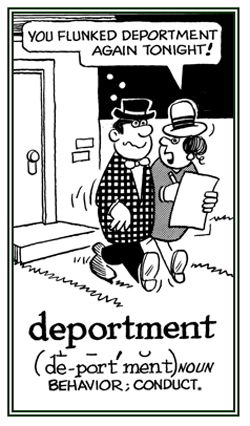de-
(Latin: from, away from, off; down; wholly, entirely, utterly, complete; reverse the action of, undo; the negation or reversal of the notion expressed in the primary or root word)
deploringly (adverb), more deploringly, most deploringly
A description of grief or sorrow for something: The passenger deploringly expressed his grief at what happened on his flight back home.
deplume
1. The removal of feathers from a bird.
2. To deprive of feathers; to pluck.
3. To strip of honor, wealth, etc.
2. To deprive of feathers; to pluck.
3. To strip of honor, wealth, etc.
depone (verb), depones; deponed; deponing
1. To make a deposition, to testify, or to declare something under oath: The lawyer, Mr. Lawson, prepared Hans, the client, to depone in court.
2. To give evidence or to testify under oath, either in a written or a verbal form: Because Celia, the witness, was ill, she was allowed to depone her confirmation in a sworn affidavit.
2. To give evidence or to testify under oath, either in a written or a verbal form: Because Celia, the witness, was ill, she was allowed to depone her confirmation in a sworn affidavit.
1. In law, someone who testifies under oath; especially, in writing: The deponent prepared a sworn affidavit in anticipation of appearing in court.
2. Anyone who gives written testimony to be used as evidence in a court of justice: The defense deponents each prepared sworn statements for the court.
2. Anyone who gives written testimony to be used as evidence in a court of justice: The defense deponents each prepared sworn statements for the court.
depopulate (verb), depopulates; depopulated; depopulating
1. To remove or to reduce the population of by destruction or expulsion.
2. To cause a country or area to have fewer people living in it.
2. To cause a country or area to have fewer people living in it.
depopulated (adjective), more depopulated, most depopulated
A reference to the loss of inhabitants as a result of war or disease.
depopulation
The condition of having reduced numbers of inhabitants or resulting in no inhabitants at all.
depopulator
1. Someone who depopulates.
2. A person who destroys or expels the inhabitants of a city, town, or country.
3. A "dispeopler".
2. A person who destroys or expels the inhabitants of a city, town, or country.
3. A "dispeopler".
deport (verb), deports; deported; deporting
1. To remove into exile, to banish; to expel from a country: The court order sought to deport the mother even though her children, Jan and Jake, were born in the country where she had been living for the last ten years.
2. To behave or to conduct oneself in a specified way: Mrs. Thompson, the dance instructor, indicated that she expected her students to deport themselves appropriately during the dance competition.
2. To behave or to conduct oneself in a specified way: Mrs. Thompson, the dance instructor, indicated that she expected her students to deport themselves appropriately during the dance competition.
Sally and Tommy, the young children, deported themselves with socially good behavior.
3. Etymology: from Modern French déporter; from Latin deportare, "to carry off, to transport, to banish, to exile"; from de-, "off, away" + portare. "to carry".
deportable (adjective), more deportable, most deportable
Subject to or punishable by being exiled or ordered to leave a specific location: Henry's deportable status as an illegal immigrant was in the process of being appealed by his lawyer in court.
1. The forcible transfer of a foreign national from a country: The deportation of Mr. and Mrs. Jackson took place when they were found to be without a visa or the official stamp in their passports that would allow them to legally enter the country.
2. The removal or sending back of aliens to the country from which they came because their presence is legally considered inconsistent with public safety: Deportations may be done without any punishments being imposed or considered for the deportees.
2. The removal or sending back of aliens to the country from which they came because their presence is legally considered inconsistent with public safety: Deportations may be done without any punishments being imposed or considered for the deportees.
A person who has been ordered to be removed from a specific area or country: Jeb, the deportee, was allowed to say goodbye to his family before boarding his plane back to his native country.
The way a person or people conduct or behave themselves; especially, according to an acceptable code of social behavior: The parents were told that if their daughter's deportment didn't improve, the school principal would have to expel her.

© ALL rights are reserved.

© ALL rights are reserved.
Go to this Word A Day Revisited Index
The football team was told on several occasions that they were required to follow the rules of good deportment on and off the field.
As the manager of the store, in addition to being in charge of the administration of the products being sold, he or she is also responsible for the deportment of the employees who are serving the customers.


Go to this Word A Day Revisited Index
so you can see more of Mickey Bach's cartoons.
depose (verb), deposes; deposed; deposing
1. To remove someone from office or from a position of power: Through a nonviolent coup, the legislators were able to depose the dictator.
2. To give evidence or to testify under oath, either in a written or verbal form: Under oath, the witness was deposing her evidence precisely and to the point.
3. To request and to record evidence from a testifier: The court was carefully deposing all of the statements from the attestant or person who affirmed the truth about what happened.

© ALL rights are reserved.

© ALL rights are reserved.
Go to this Word A Day Revisited Index
2. To give evidence or to testify under oath, either in a written or verbal form: Under oath, the witness was deposing her evidence precisely and to the point.
3. To request and to record evidence from a testifier: The court was carefully deposing all of the statements from the attestant or person who affirmed the truth about what happened.


Go to this Word A Day Revisited Index
so you can see more of Mickey Bach's cartoons.
1. Something, such as money, that is entrusted for safekeeping, as in a savings institution: Sharon makes regular deposits to the bank every Friday.
3. A sum of money given as security for an item acquired for temporary use: Adam left a considerable sum as a deposit for the purchase of a new car.
4. Something left or lain down; especially, by a natural process; such as, the concentration of mineral matter or sediment in a layer, vein, or pocket: There were rich deposits of oil and natural gas in the area.
5. In physiology, an accumulation of organic or inorganic material; such as, a lipid or mineral, in a body tissue, structure, or fluid: Karl's legs were swollen because of the deposit of excess fluid in his muscles and tissues.
6. A sediment or precipitate that has settled out of a solution: There appeared to be a dark brown deposit at the bottom of the test tube.
7. A coating or crust left on a surface as a result of evaporation or electrolysis: There was a tough deposit on the finish of the old paint that was caused by evaporation.
Jason's deposit was made after the commercial house closed and so it would be recorded in the morning.
2. A partial or initial payment of a cost or debt: Mary left a $300 deposit toward the purchase of a stereo system.3. A sum of money given as security for an item acquired for temporary use: Adam left a considerable sum as a deposit for the purchase of a new car.
4. Something left or lain down; especially, by a natural process; such as, the concentration of mineral matter or sediment in a layer, vein, or pocket: There were rich deposits of oil and natural gas in the area.
5. In physiology, an accumulation of organic or inorganic material; such as, a lipid or mineral, in a body tissue, structure, or fluid: Karl's legs were swollen because of the deposit of excess fluid in his muscles and tissues.
6. A sediment or precipitate that has settled out of a solution: There appeared to be a dark brown deposit at the bottom of the test tube.
7. A coating or crust left on a surface as a result of evaporation or electrolysis: There was a tough deposit on the finish of the old paint that was caused by evaporation.


